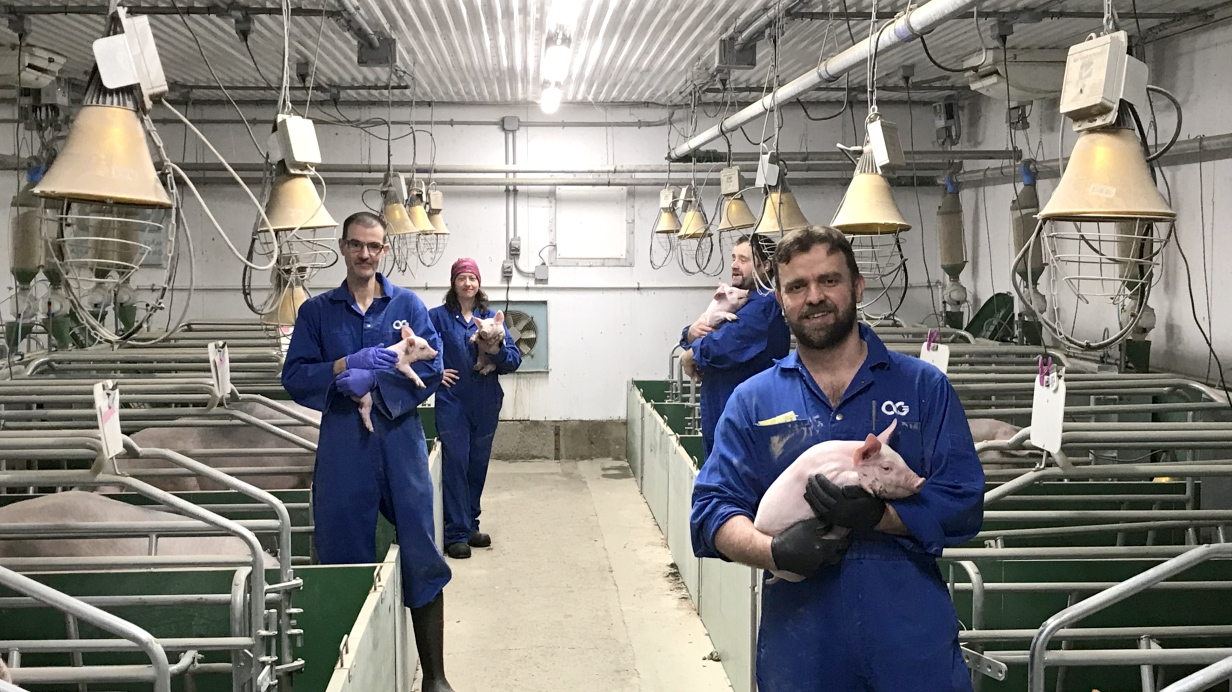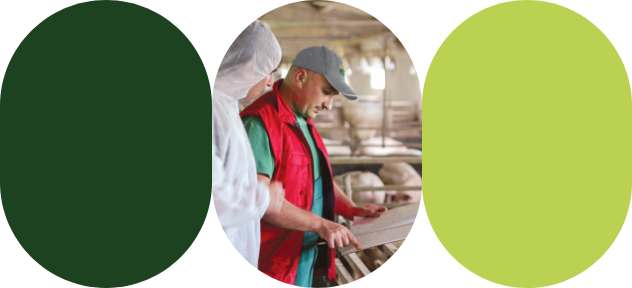AlphaGene: Swine genetics for group rearing
Since farmers adapt their facilities to house pregnant sows in groups, AlphaGene has taken steps to provide animals genetically conditioned to live in groups.
AlphaGene, Olymel’s swine genetics division, has acquired the farm of La Coop Purdel (now Unoria Coopérative) in Saint-Valérien-de-Rimouski, Québec. It has set up a new nucleus unit there, where it rears 1,200 pregnant gilts in a group.
“It’s important for us to have a nucleus unit that resembles commercial production farms and meet the new animal welfare standards,” says Nicole Dion, Geneticist at Olymel. She notes that AlphaGene sells its genetics not only in Québec, but throughout Canada.
“Animals that spend their whole lives in cages do not behave the same way with their peers as those reared in a free-range environment,” she says. Pigs are naturally inclined to live in groups, but some are more social than others. “That’s why it’s important to select animals that adapt more easily to living in a group.”
“Developing genetics with specific criteria usually takes a full year,” says Dion. “You have to go through the whole cycle of gestation, farrowing and piglet rearing.”
Forming a new nucleus unit
The sows that make up the Saint-Valérien nucleus unit come from different AlphaGene finishing sites. Later on, the unit will be replenished with gilts from sites directly linked to the Saint-Valérien farrowing facility, i.e., from local fattening farmers who are members of Unoria Coopérative.
Dion notes that “We select and multiply sows in the new Saint-Valérien drove. This is unusual, but there are advantages.” She gives the example of two sister gilts: “Based on the genetic data that I obtain, I will keep the sow that I think is the best in the nucleus unit and send the other one to the multiplier unit. But sometimes I am wrong, and the one that was sent to the multiplier unit will turn out to be the best.” If that happens, Dion can take the sow back to the nucleus unit because it is in the same building. She believes that this speeds up genetic improvement.
A healthy environment at AlphaGene
The animals selected by AlphaGene are known for being calm. “The people who work on our farms are not abrasive and do not tolerate aggressive animals,” says Dion.
This rearing environment helps the gilts adapt to group life. “This is one of our many criteria, along with litter size, piglet quality, milking capacity and sow characteristics,” says Marquis Roy, Technical Director at Olymel. “We quickly found that our sows adapt well in the droves of our customers who have switched to group-housing pregnant sows.” Mortality rates and leg problems have not increased, unlike in droves not using AlphaGene genetics.
AlphaGene has a long-standing partnership with Axiom Genetics (formerly Gène+), a French company specializing in the development of swine genetics. In Europe, “they have been rearing nucleus units in groups since 2014,” says Roy. “This could explain why our animals have a certain natural ability to live in groups.”
AlphaGene genetics have other advantages. According to Dion and Roy, they produce very prolific sows that wean many piglets per litter, and the piglets are very vigorous. At the finishing stage, the animals convert feed very well and grow fast. They meet the carcass and meat quality requirements of Olymel and the entire network.
Buildings and management
Gestation area
AlphaGene renovated the gestation area of a building with 1,200 sows and 3,600 nursery spots. It built 12 pens for 60 sows each and installed three feeding stations in each pen. The sows take turns at the feeding stations, where a door closes behind them so that they can eat in peace. IEL supplied all of this equipment, which is automated using Maximus technology.
Farrowing area
This area has also been renovated. The number of rooms has been reduced, but the number of cages is still 224. “We have regained the space in front of the sows to install larger cages measuring 1.8 m by 2.4 m (6 ft by 8 ft) instead of 1.5 m by 2.1 m before the changes,” says Sylvain Faucher, Director of AlphaGene.
To eat, the sows have to touch a lever that activates the feeder. Faucher says that “unlike in the gestation area, where the amount of feed is limited based on a feeding curve adapted to each sow’s body condition and gestation stage, in this area, it’s like an all-you-can-eat buffet.”
Insemination area
Very little work has been done in this area, but AlphaGene has updated most of the equipment, and the cages meet industry standards. Here too, the feeding system distributes rations based on each sow’s body condition and physiological stage.
Drove management
Swine are produced in groups four weeks apart. A group of 224 sows farrow over a period of three to four days. All piglets are weaned on the same day, at an average age of 20 days, and then transferred to a nursery. This practice has many benefits for staff work, but most importantly it allows time for the farrowing area to be emptied, washed and disinfected every four weeks.
In addition, producing a large number of piglets of the same age at weaning allows the nurseries and feedlots to be managed in an all-in all-out system. “We can’t sell genetics if our swine are not exceptionally healthy,” says Faucher. “At AlphaGene, we maintain an excellent level of health, and all-in all-out management is a must if we want to keep it that way.”
Future plans for swine genetics
AlphaGene has two other nucleus units where swine are housed in cages (which will be converted to free-range at a later date) and where three breeds are produced: Landrace, Yorkshire and Duroc. Determined to make Bas-Saint-Laurent its stronghold for swine genetics, AlphaGene plans to double its farrowing production, according to Faucher.
He would like to thank the people at La Coop Purdel for agreeing to hand over the Saint-Valérien farrowing facility to Olymel. “This gives AphaGene the opportunity to continue its development in an area that is safe for the health of its droves,” he says.
Faucher also highlights the trust shown by farmers in the region. By agreeing to receive piglets from AlphaGene’s nursery, they are contributing to the production of future breeding stock in good health and with high genetic potential (see the article on the Saint-Eugène farm).
Find out more about AlphaGene genetics and the La Coop certified pork program.
Source: This article was originally published in French in the January–February 2021 issue of Coopérateur magazine.
In the photo, in the usual order: Stéphane Pelletier, Nathalie Morissette, Sylvain Labrie et Sébastien Proulx. Were absent when the photo was taken: Jean-Claude Beaupré, Benjamin Beaupré et Daniel Cimon (photo credit : Olymel).


